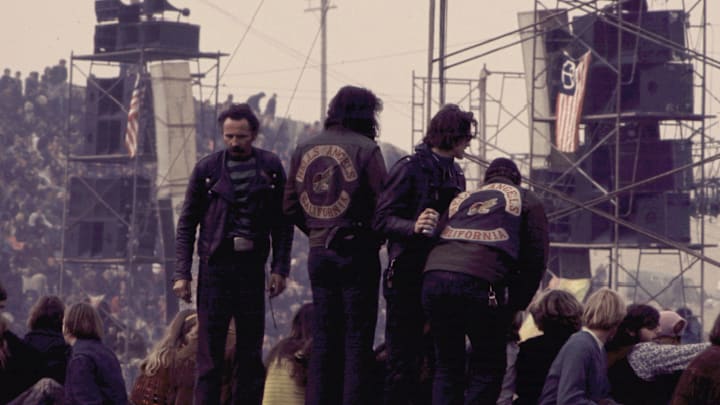The Last Waltz (1978)
Until Jonathan Demme’s Stop Making Sense came along in 1984, this Martin Scorsese documentary was generally considered the gold standard of concert films. It is a chronicle of the farewell performance of The Band, from their Thanksgiving Day concert in 1976. They had a few guests join them for the show. Joni Mitchell showed up. So did Neil Young. And Muddy Waters. And Eric Clapton, and Van Morrison. Some cat named Dylan. And that’s not all.
Obviously, it was a star-studded event. Scorsese moved his camera in close, which was a bit of a departure from the standard way of shooting live performances. The close-ups convey a sense of emotion that can oftentimes be missing from high-energy concert footage.
He also edited post-concert interviews with the band to further get into their heads. That technique was not new, as we will see in a more famous example soon to come. New York Times critic Janet Maslin noted in her contemporaneous review that the generically-named Band had been mostly anonymous through their glory days, and Scorsese does a very good job of giving them individual personalities throughout the movie.
That’ll Be the Day/Stardust (1973/75)
Here’s your two-fer, a pair of British movies from the early ‘70s that passed by largely unnoticed in the USA, but which nonetheless hold a special place in the hearts of many Brits. The two moves were directed by different men (Clause Whatham and Michael Apted) so the unifying voice behind them is producer David Puttnam. He worked with screenwriter Ray Connolly and lead actor David Essex on both movies.
The first movie, a gritty kitchen-sink drama about a frustrated young man, Jim MacLaine, with dreams of rock and roll stardom, maybe a better movie. The sequel, which picks up with Jim’s story as he becomes a roaring success, maybe a better music movie.
The fact that David Essex was essentially going through the exact same arc as the character he was playing gave the movie extra interest. “Rock On” became a massive hit right in between the release of the two movies. One of Puttnam’s producer tricks was to partner up with Ronco Records, who had great success releasing compilation albums in the early ‘70s.
Puttnam promised to play lots of good music in both movies an sell the soundtrack rights to Ronco to release as an album. They got product. He got much-needed cash.
And, to top it all off – remember that Frank Zappa movie that featured appearances by Ringo Starr and Keith Moon? Both of them show up in these movies in very significant ways. (Starr begged out of the sequel, but plays a major role in the first film.) Other icons of early British rock like Billy Fury, Marty Wilde, and Dave Edmunds show up in large and small ways.
